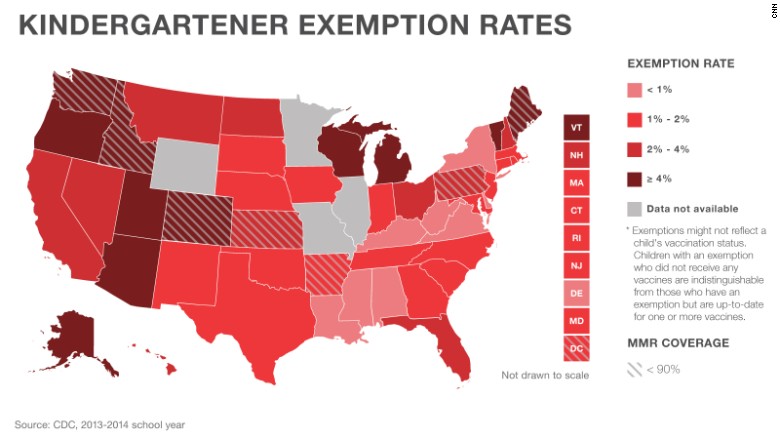We're crossing over from politics into politically-charged science today, to talk about vaccines and autism. A small but growing number of parents are not vaccinating their children for fear of complications, most notably autism. Interestingly, this movement has a core following on both the far left and far right of the political spectrum.
According to the CDC, approximately 5% of the children in kindergarten had not had their Measles, Mumps and Rubella (MMR) vaccine. While this may seem like a relatively small portion of the population, it is important to remember that this threatens the "herd immunity" effect and even a small number of vulnerable children can pose a serious threat to infants who are not old enough to receive the vaccine. Furthermore, these densities are not evenly distributed across the nation, with groups of parents opting out of vaccines clustering together into regions of <80% adherence.

Greedy Big Pharma or One Greedy Individual?
The anti-vaccine movement appears to all stem from a 1998 study by a British gastroenterologist named Andrew Wakefield. He presented a paper where he claimed that he examined eight children who presented symptoms of autism shortly after receiving an MMR vaccine. According to the paper, these children all showed gastrointestinal distress, from which Wakefield postulated a complex theory of causes and effect. The method and approach of this study was a horrible example of bad science and bad statistics, where a small self-selected group of subjects were used without any objective measures like a control group or measures of coincidence, or even basic approval by a board of ethics. In fact, later studies have been unable to find any of the symptoms Wakefield describes. An excellent summary of the study can be found here.
Beyond the shoddy science behind the study is another shadier story. Apparently, Wakefield was not claiming that vaccines were bad in general. In fact, he had just patented his own MMR vaccine to compete with the one he claimed caused autism, expecting to make $43M a year. At the same time, he was also selling autism detection kits based on his "findings," an endeavor which the parents of several of his subjects were investors.
In the fallout from this flawed study and questioning of Wakefield's motives, the paper's publisher retracted the publication. Wakefield was found guilty of more than thirty charges and barred from practicing medicine in the UK. In 2011, Wakefield's own raw data was revealed, contradicting the results he presented in the paper.
Despite this overwhelming wave of evidence discrediting and contradicting every point in Wakefield's conclusions, he stands firm in his original position, claiming to be the victim of conspiracy and persecution from an establishment. While Wakefield himself is unable to realize the huge earnings he envisioned, plenty of others have been eager to pick up the banner (and the revenues) by positioning themselves as outsider medical experts.
537,303 Anecdotes
To be fair, we will give Wakefield's theory a serious consideration and look at the statistics. His hypothesis is that the MMR vaccine is a direct cause of autism. It is clearly not a 100% causation (or else most of the children in the UK and US would have autism). Also, Wakefield does not claim that MMR vaccines are the sole cause of autism, so even unvaccinated children may still develop it. However, by this theory, we would expect a significant increase in the rate of diagnosis of autism for people who had the vaccine versus those whose parent's opted out.
There are a number of population studies that performed just that analysis. The largest, and possibly most relevant to Wakefield's theory, is a study of 537,303 Danish children who were born between 1991 and 1998 (matching the years in Wakefield's research). This study showed that the 82.0% that were given the MMR vaccine had the same risk of autism as the 18.0% who did not receive the vaccine.
Many[1] other[2] studies[3] also[4] show[5] no difference[6] in[7] autism[8] rates[9]. Regardless of how or why a vaccine could cause autism, simple observation shows that two populations, living side by side, have the same autism rate. You're not going to get a smaller margin of error than that.

No comments:
Post a Comment